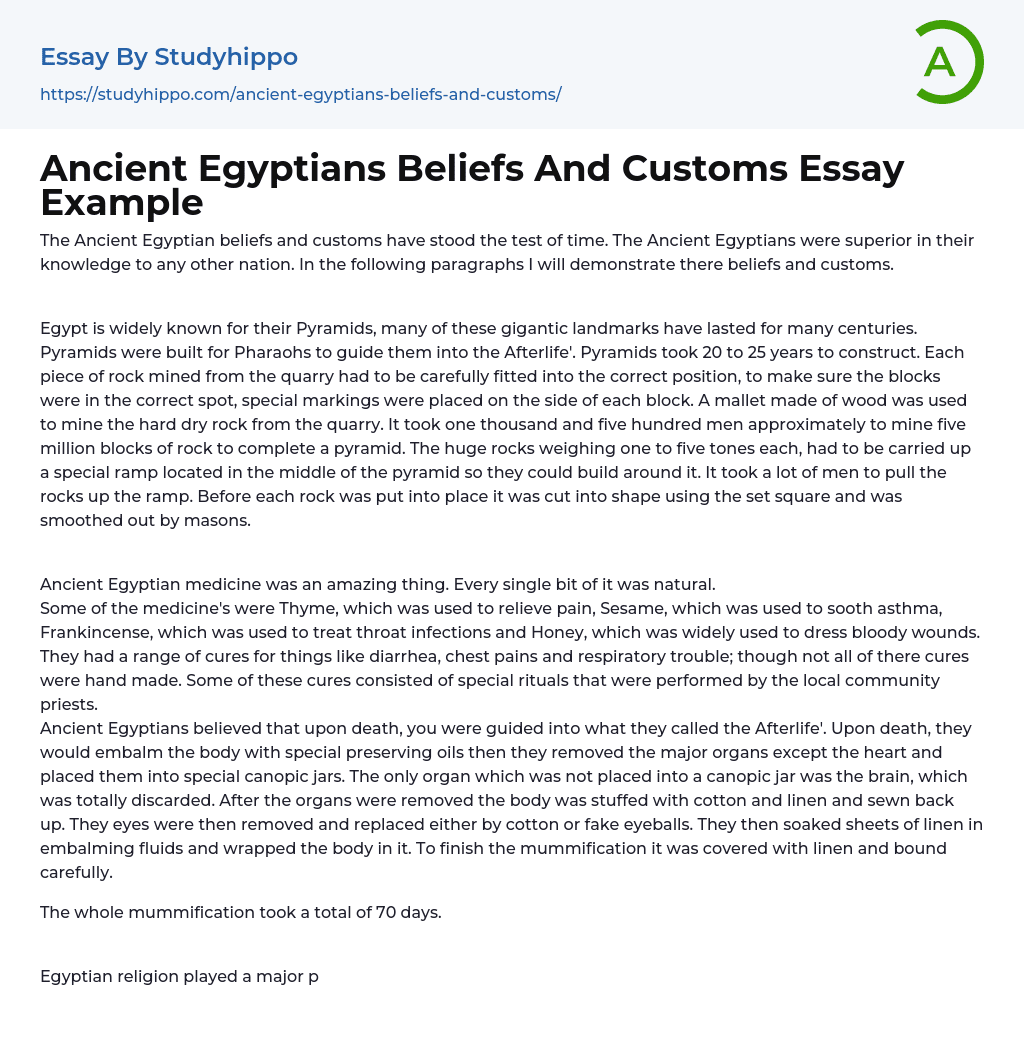The Ancient Egyptian beliefs and customs have stood the test of time. The Ancient Egyptians were superior in their knowledge to any other nation. In the following paragraphs I will demonstrate there beliefs and customs.
Egypt is widely known for their Pyramids, many of these gigantic landmarks have lasted for many centuries. Pyramids were built for Pharaohs to guide them into the Afterlife'. Pyramids took 20 to 25 years to construct. Each piece of rock mined from the quarry had to be carefully fitted into the correct position, to make sure the blocks were in the correct spot, special markings were placed on the side of each block. A mallet made of wood was used to mine the hard dry rock from the quarry. It took one thousand and five hundred men approximately to m
ine five million blocks of rock to complete a pyramid. The huge rocks weighing one to five tones each, had to be carried up a special ramp located in the middle of the pyramid so they could build around it. It took a lot of men to pull the rocks up the ramp. Before each rock was put into place it was cut into shape using the set square and was smoothed out by masons.
Ancient Egyptian medicine was an amazing thing. Every single bit of it was natural.
Some of the medicine's were Thyme, which was used to relieve pain, Sesame, which was used to sooth asthma, Frankincense, which was used to treat throat infections and Honey, which was widely used to dress bloody wounds. They had a range of cures for things like diarrhea, chest pains and respiratory trouble; though no
all of there cures were hand made. Some of these cures consisted of special rituals that were performed by the local community priests.
Ancient Egyptians believed that upon death, you were guided into what they called the Afterlife'. Upon death, they would embalm the body with special preserving oils then they removed the major organs except the heart and placed them into special canopic jars. The only organ which was not placed into a canopic jar was the brain, which was totally discarded. After the organs were removed the body was stuffed with cotton and linen and sewn back up. They eyes were then removed and replaced either by cotton or fake eyeballs. They then soaked sheets of linen in embalming fluids and wrapped the body in it. To finish the mummification it was covered with linen and bound carefully.
The whole mummification took a total of 70 days.
Egyptian religion played a major part in the development of their civilization. They had Gods which they worshiped, to praise their Gods the Ancient Egyptians held festivals for them. Each God had to be equally praised to ensure the Ancient Egyptians good health and prosperity, special temples were where the Ancient Egyptians thought of as the Gods dwelling place, each town had a temple for the God of that city. Ancient Egypt's religion consisted of many Gods, as most of our religions only consist of one God. Upon death of an Egyptian, the would mummify there body then lay them to rest. Rich families were laid to rest in gold filled tombs, whilst poor families were laid to rest in the sand. The Ancient Egyptian left food, drink
and personal belongings in the tombs so when the were guided into the afterlife they could survive in the afterlife. Ancient Egyptians also worshiped many of their animals as they believed that animals were the Gods, only in animal form. The Gods were believed to perform different things, some were believed to heal, others to punish.
In conclusion Ancient Egyptian culture was a remarkable phenomenon, there landmarks were all made by hand and still stand today after hundreds of years, there medicine which was all natural and worked, there beliefs to mummify there dead to ensure a safe journey to the afterlife and there religion which I believe helped create the civilization and the landmarks left.
Bibliography-
World Book 2000 (E-D)
Internet (Google, Aks Jeeves)
- Afterlife essays
- Atheism essays
- Bible essays
- Buddhism essays
- Christian Worldview essays
- Christianity essays
- Confession essays
- Cosmological Argument essays
- Deism essays
- Devil essays
- Existence of God essays
- Faith essays
- Freedom Of Religion essays
- God essays
- Hinduism essays
- Immortality essays
- Islam essays
- Jainism essays
- Jews essays
- Judaism essays
- Miracle essays
- Monk essays
- Monotheism essays
- New Testament essays
- Old Testament essays
- Pilgrimage essays
- Puritans essays
- Revelation essays
- Ritual essays
- Salvation essays
- Sin essays
- Sinners essays
- Soul essays
- Taoism essays
- Temple essays
- Theology essays
- Abolitionism essays
- Adam Smith essays
- American History essays
- American Revolution essays
- Ancient Egypt essays
- Articles Of Confederation essays
- Atlantic Slave Trade essays
- Aztec essays
- Benjamin Franklin essays
- Civil Rights Act of 1964 essays
- Civil Rights Movement essays
- Civil war essays
- Cleopatra essays
- French And Indian War essays




